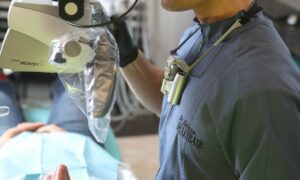Tooth extraction is a common dental procedure that many individuals undergo for various reasons, such as severe decay, overcrowding, or impacted wisdom teeth. While the thought of having a tooth removed may feel daunting, understanding the process, reasons, and aftercare can make the experience smoother and less intimidating. This guide covers everything you need to know about tooth extraction, including what to expect and how to care for your mouth afterward.
If you’re looking for professional Tooth Extraction Services, choosing a trusted provider like Dentist 111 ensures a safe and comfortable experience.
What Is Tooth Extraction?
Tooth extraction is the removal of a tooth from its socket in the jawbone. This procedure is typically performed by a dentist or oral surgeon and may involve either a simple extraction (for visible teeth) or a surgical extraction (for teeth that are broken or impacted).
Why Is Tooth Extraction Necessary?
There are several reasons why tooth extraction might be required:
1. Severe Decay or Infection
When a tooth is extensively damaged by decay or infection and cannot be saved with treatments like fillings or root canals, extraction becomes necessary to prevent the infection from spreading.
2. Overcrowding
In cases where there isn’t enough room for all the teeth to align properly, tooth extraction may be recommended before orthodontic treatments like braces.
3. Impacted Wisdom Teeth
Wisdom teeth that fail to emerge properly or become trapped in the gums or jawbone can lead to pain, infections, and alignment issues, often requiring surgical extraction.
4. Gum Disease
Severe gum disease (periodontitis) can weaken the support structure of teeth, leading to the need for extraction.
5. Trauma or Injury
A tooth that is severely damaged due to an accident may need to be extracted if it cannot be repaired.
What to Expect During Tooth Extraction
- Understanding the procedure can ease anxiety about tooth extraction:
1. Pre-Procedure Preparation
Before the extraction, your dentist will:
- Take X-rays to assess the tooth and surrounding structures.
- Discuss your medical history and any medications you’re taking.
- Administer local anesthesia to numb the area, or sedation if needed for surgical extractions.
2. The Extraction Process
- Simple Extraction: The dentist uses specialized tools to loosen and remove the tooth.
- Surgical Extraction: This involves making a small incision in the gum to remove a tooth that is not easily accessible, such as impacted wisdom teeth.
3. Post-Extraction Care
After the tooth is removed:
- Gauze is placed over the socket to control bleeding.
- Instructions for aftercare are provided to promote healing and prevent complications.
Tips for a Smooth Recovery
Proper aftercare is essential for healing after a tooth extraction. Here are some tips:
1. Manage Pain and Swelling
- Use over-the-counter pain relievers as recommended by your dentist.
- Apply a cold compress to reduce swelling.
2. Maintain Oral Hygiene
- Avoid brushing near the extraction site for the first 24 hours.
- Rinse gently with warm saltwater to keep the area clean.
3. Follow a Soft Diet
- Eat soft, cool foods like yogurt, mashed potatoes, and smoothies to avoid irritating the site.
- Avoid hard, crunchy, or hot foods that can dislodge the clot.
4. Avoid Smoking or Using Straws
- Smoking and using straws can cause dry socket, a painful condition where the clot is dislodged from the socket.
5. Keep Follow-Up Appointments
- Attend all follow-up visits with your dentist to ensure proper healing and address any concerns.
When to Call Your Dentist
While tooth extraction is generally a safe procedure, you should contact your dentist if you experience:
- Persistent pain or swelling
- Excessive bleeding
- Signs of infection, such as fever or foul-smelling discharge
If you’re in need of expert Tooth Extraction Services, Dentist 111 provides compassionate care and ensures your comfort throughout the process.
How to Prevent Tooth Extraction
While some extractions are unavoidable, maintaining good oral hygiene can reduce the likelihood of needing one. Here’s how:
- Brush twice a day with fluoride toothpaste.
- Floss daily to remove plaque between teeth.
- Visit your dentist regularly for check-ups and cleanings.
- Wear a mouthguard during sports to prevent dental injuries.
Why Choose Dentist 111 for Tooth Extraction Services?
When it comes to tooth extraction, it’s essential to choose a dental provider you can trust. Dentist 111 offers:
- Highly trained professionals with expertise in extractions.
- Advanced technology and techniques for a safe and efficient procedure.
- A patient-first approach, ensuring your comfort and care every step of the way.
Whether you’re dealing with a painful wisdom tooth or planning orthodontic treatment, our Tooth Extraction Services provide personalized solutions tailored to your needs.
Conclusion
Tooth extraction may seem intimidating, but with the right knowledge and professional care, the process can be straightforward and stress-free. Understanding the reasons for extraction, the procedure, and recovery tips can help you feel more prepared. Regular dental care and preventive measures can also minimize the need for extractions in the future.
For reliable and compassionate Tooth Extraction Services, visit Dentist 111 and take the first step toward a healthier smile.



























